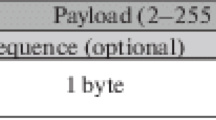Abstract
It is commonly accepted that the 3rd Generation Public Partnership Long Term Evolution (also known as 3GPP LTE) standard is likely to be unfit for future large scale machine type communication (MMTC). As a result, a new standard, LTE Narrow-Band Internet of Things (NB-IoT) and several radio protocol proposals are being developed. One of the main performance indicators for MMTC is the radio energy consumption. It is important to be able to evaluate the energy consumption of the new standard and the proposed protocols, therefore a generic energy consumption evaluation methodology tailored for MMTC devices is required. Such methodology is the contribution of this paper. It is developed by defining a generic radio transmission and describing the factors which affect the energy consumption. Special attention is put on the factors; power control, link-level performance and a radio power model with a non-constant power amplifier (PA) efficiency model intended for MMTC devices. The results show the impact of the factors and highlight first that applying a commonly used constant radio PA efficiency model can result in an overestimation of the battery life of up to 100% depending on the traffic scenario. It is also highlighted that combining power control, transmit repetitions and the radio power model opens for new methods to minimize the radio energy consumption.
Access this chapter
Tax calculation will be finalised at checkout
Purchases are for personal use only
Similar content being viewed by others
References
3GPP: Study on Enhancements to Machine Type Communications and Other Mobile Data Applications. TR 37.869 V12.0.0, September 2013
3GPP: Study on Enhancements to Machine Type Communications and Other Mobile Data Applications Communications Enhancements. TR 23.887 V12.0.0, December 2013
3GPP: Cellular System Support for Ultra Low Complexity and Low Throughput Internet of Things. TR 45.820 V2.1.0, August 2015
3GPP: E-UTRA: Physical Channels and Modulation. TS 36.211 V12.8.0, December 2015
3GPP: Narrowband LTE - Synchronization Channel Design and Performance. R1–156009, October 2015
3GPP: NB-PBCH Design for NB-IoT. R1–160441, February 2016
3GPP: UE Battery Life Evaluation for mMTC Use Cases. R1–165008, May 2016
Biral, A., Centenaro, M., Zanella, A., Vangelista, L., Zorzi, M.: The challenges of M2M massive access in wireless cellular networks. Digit. Commun. Netw. 1(1), 1–19 (2015)
Fantastic-5G: Technical Results for Service Specific MultiNode/Multi-Antenna Solutions. Public Deliverable D4.1, H2020-ICT-2014-2, June 2016
Holma, H., Toskala, A.: WCDMA for UMTS: HSPA Evolution and LTE. Wiley, Hoboken (2007)
Jover, R., Murynets, I.: Connection-less communication of IoT devices over LTE mobile networks. In: 2015 12th Annual IEEE International Conference on Sensing, Communication, and Networking (SECON), pp. 247–255, June 2015
Lauridsen, M., Noël, L., Sørensen, T., Mogensen, P.: An empirical LTE smartphone power model with a view to energy efficiency evolution. Intel Technol. J. 18(1), 172–193 (2014)
Laya, A., Alonso, L., Alonso-Zarate, J.: Is the random access channel of LTE and LTE-A suitable for M2M communications? A survey of alternatives. IEEE Commun. Surv. Tutor. 16, 4–16 (2014)
Madueno, G., Stefanovic, S., Popovski, P.: Efficient LTE access with collision resolution for massive M2M communications. In: Globecom Workshops (GC Wkshps), pp. 1433–1438, December 2014
Saur, S., Weber, A., Schreiber, G.: Radio access protocols and preamble design for machine type communications in 5G. In: IEEE 49th Asilomar Conference on Signals, Systems, and Computers, November 2015
Zanella, A., Zorzi, M., dos Santos, A., Popovski, P., Pratas, N., Stefanovic, C., Dekorsy, A., Bockelmann, C., Busropan, B., Norp, T.: M2M massive wireless access: challenges, research issues, and ways forward. In: 2013 IEEE Globecom Workshops (GC Workshops), pp. 151–156, December 2013
Acknowledgments
This work has been partly performed in the framework of the Horizon 2020 project FANTASTIC-5G (ICT-671660) receiving funds from the European Union. The authors would like to acknowledge the contributions of their colleagues in the project, although the views expressed in this contribution are those of the authors and do not necessarily represent the project.
Author information
Authors and Affiliations
Corresponding author
Editor information
Editors and Affiliations
Rights and permissions
Copyright information
© 2016 Springer International Publishing AG
About this paper
Cite this paper
Jacobsen, T., Kovács, I.Z., Lauridsen, M., Hongchao, L., Mogensen, P., Madsen, T. (2016). Generic Energy Evaluation Methodology for Machine Type Communication. In: Madsen, T., Nielsen, J., Pratas, N. (eds) Multiple Access Communications. MACOM 2016. Lecture Notes in Computer Science(), vol 10121. Springer, Cham. https://doi.org/10.1007/978-3-319-51376-8_6
Download citation
DOI: https://doi.org/10.1007/978-3-319-51376-8_6
Published:
Publisher Name: Springer, Cham
Print ISBN: 978-3-319-51375-1
Online ISBN: 978-3-319-51376-8
eBook Packages: Computer ScienceComputer Science (R0)




